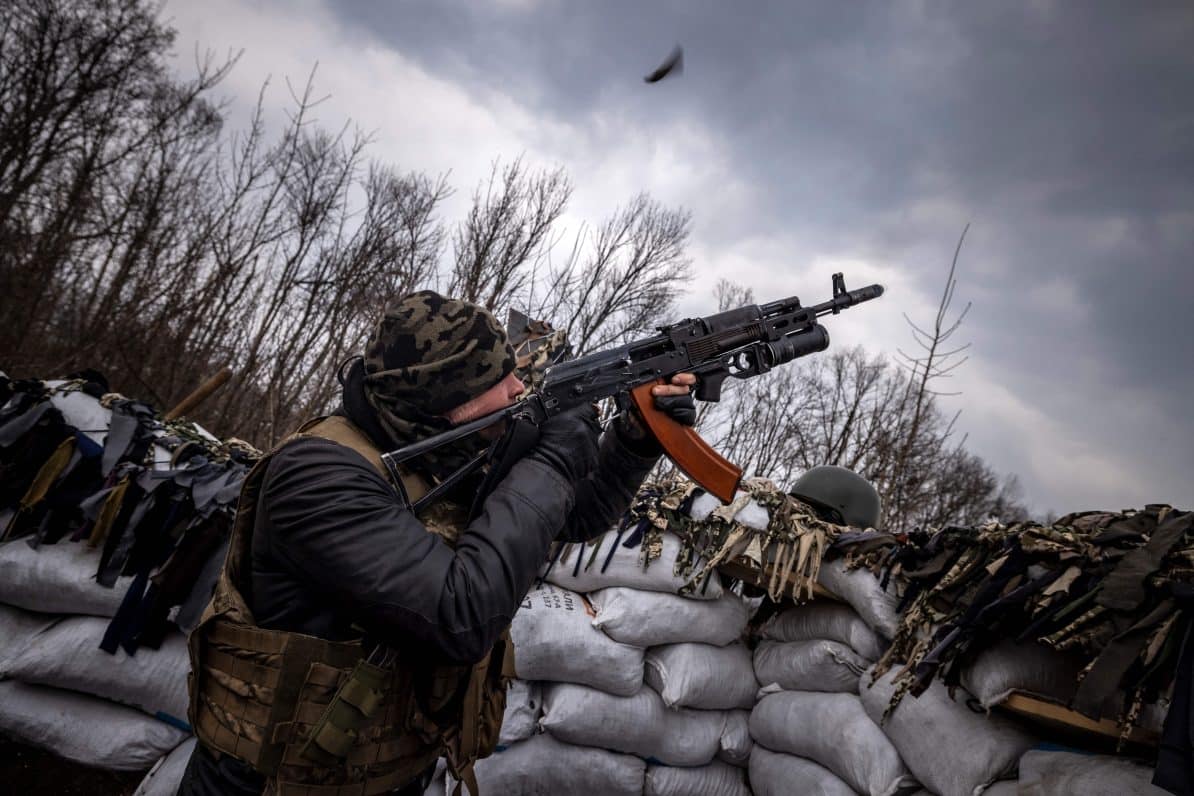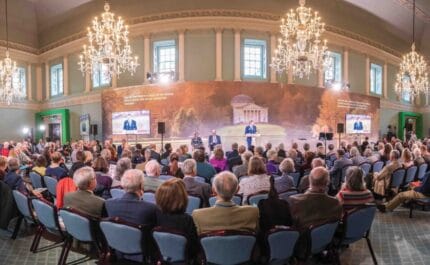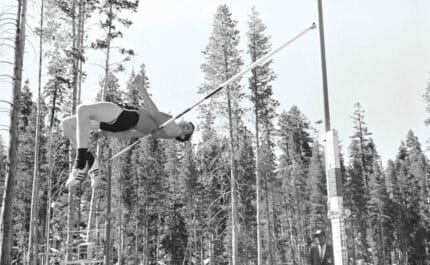The first days of war: The pacifist who took up arms
On 24th February Russian tanks rolled into Ukraine, unleashing a new European conflict that would swiftly destroy large swathes of the country and leave thousands dead. In this online-only article, we speak to a journalist who put down his pen and picked up a weapon in order to defend his country

A Ukrainian troop shoots at a Russian drone with an assault rifle from a trench at the front line east of Kharkiv on 31st March 2022. Photo by Fadel Senna / AFP
24th Feb 2022
We spoke to several people in Ukraine and Russia whose lives were thrown into disarray by the outbreak of war. This article is an online exclusive; the other pieces can be found in issue 46 of Delayed Gratification, which can be purchased at our online shop
The pacifist who took up arms
How journalist Serhiy Lefter found himself on the front line
Serhiy Lefter was tired and anxious. As a journalist he’d been closely following the build-up of the Russian military on Ukraine’s borders for weeks. In the early hours of 24th February he awoke, once again, from a fitful sleep. The night was quiet and still. In the darkness he reached for his phone to check the news. A flight heading from Georgia to Ukraine had been grounded and airspace above his country closed. Moving quietly, he slipped out of the bedroom to the living room. When he opened his laptop to watch the news, Russian president Vladimir Putin was delivering a speech announcing the start of a “special military operation” in Ukraine. “As soon as the speech ended, I heard rocket explosions,” he tells me. The war had started. In the dark he sat and listened to the booms echoing across Kyiv alone, not wanting to wake up his still slumbering girlfriend. “I knew that would be her last normal sleep for quite some time.”
Lefter had already experienced first-hand the violence that Russia had inflicted on his country. He had reported on Russia’s annexation of Crimea in 2014 and then on the separatist conflict that erupted in the east. While reporting in Slovyansk, a city in eastern Ukraine, Lefter was kidnapped by the Russian-backed militants who controlled the city at the time. His captors badly beat him during repeated interrogations, and at night he slept tied up on a filthy basement floor. Although Lefter was released after 17 days, two young pro-Ukrainian activists he shared a cell with did not make it out alive. Both Yuri Dyakovsky and Yuriy Popravka were tortured, executed and their bodies dumped in a river.
Before the Russian invasion of Ukraine started, Lefter and his girlfriend had formulated a plan. He would evacuate his girlfriend to the relative safety of her parents’ house in western Ukraine and then return to Kyiv. Once she was safe, Lefter planned to head once again to the frontline. This time, however, he decided that he would not be a journalist armed with a reporter’s notebook but a soldier carrying a gun. Confronted with long queues at the enlistment offices as Ukrainian men flocked to defend their country, Lefter began calling friends to see if anyone could help him find a quick route into the army. Eventually he found a space at a Territorial Defence Unit, part of the Ukrainian Armed Forces, through a lawyer friend who’d already been training with the unit. On March 21st he signed up.
At first, he tells me, he was a “little embarrassed to join the military because I was a lifelong pacifist”. Adapting to the rigours of army life, he explains, wasn’t easy for him. With no military experience he was put into a basic training programme to become a marksman and assistant machine gunner. “You are told how to wear your socks, how to lace up your shoes, how to properly fasten the belt to the machine, how to wear the machine, how to brush your teeth, how to sleep properly, just about everything is decided for you,” he says. But despite his dislike for such a highly regimented lifestyle, Lefter bonded quickly with the other men in his training group. Although, due to his inexperience, he hadn’t expected to head into active combat straight away, when Lefter learned that some of his new friends were being sent to fight on the frontline near Kharkiv, Ukraine’s second-largest city, he went to the unit’s commander and volunteered himself to be added to the list. “I realised I wanted to go to war in the east with the people I had befriended,” he says.
By early June, just eight weeks or so after he had enlisted, Lefter was heading to the front. Not long after they arrived at the base, his unit was assigned to relieve a group in danger of being surrounded in a village close to Kharkiv, which was under heavy bombardment. It was a dangerous mission. When they reached their position at the front Lefter, along with ten other soldiers, was ordered by the commander to dig in a machine gun. Russian tanks were just a few hundred metres away. The fighting was so heavy it was only possible to move around through a network of trenches that offered a modicum of protection. Lefter had only just picked up a spade and begun to dig when a shell struck. “At that moment I heard nothing and everything around me turned white,” he tells me. “I felt myself falling to the ground.” When Lefter came to, the world was spinning around him and he could see his friends sprawled on the ground. The shell had landed just metres away. The force of the explosion had thrown them all to the floor. Looking down he saw blood soaking through his trousers and the right side of his face felt like it was on fire. In his arm he felt a searing pain. Slowly he managed to crawl to a colleague who applied a tourniquet to it.
Two weeks later, recovering in Kharkiv hospital, Lefter’s wounds have been cleaned of shrapnel. The skin on the right side of his face and ear were badly burned, leaving his skin a puckered angry red. Slowly, however, his wounds are healing despite complications from having donated blood shortly before being injured. “I feel like superman compared to when I arrived here,” he says from his hospital bed. But damage to his vestibular system, the part of the ear that deals with balance, has left him unsteady on his feet. “I walk like I’m drunk even though I haven’t touched alcohol in three years.” Nonetheless Lefter feels fortunate that he and the other men in his unit have lived to tell the tale.“We were lucky that there was only one incoming round, because shells are usually fired twice at the same place” he says.
Five months into the war, Lefter remains confident of a Ukrainian victory but knows it will come at a heavy cost. “We will win. The only question is, unfortunately, the number of victims. Justice is on our side, and justice always wins, no matter how pathetic it may sound. Victory is only a matter of time and weapons.”
Once he has recovered, Lefter says he is prepared to return to fight on the frontline again if he is called upon, yet he remains a pacifist at heart. “The army is not my interest, but as a citizen of Ukraine I felt an obligation to defend my country,” he says. “I just want Russia to give us peace, not to act like a gopnik,” he says using a Russian slang term for a vicious thug. And while other injured soldiers spend their days browsing military equipment online Lefter busies himself with the happier task of researching camping gear online in preparation for a trip to the Carpathian Mountains once peace returns to Ukraine. “My thoughts are all about going hiking in the mountains,” he says.
Slow Journalism in your inbox, plus infographics, offers and more: sign up for the free DG newsletter. Sign me up
Thanks for signing up.








